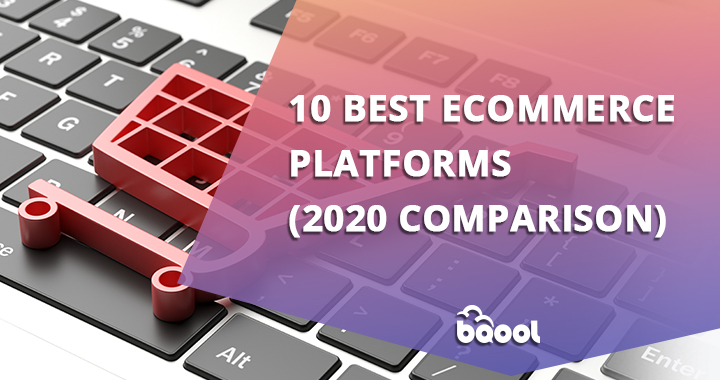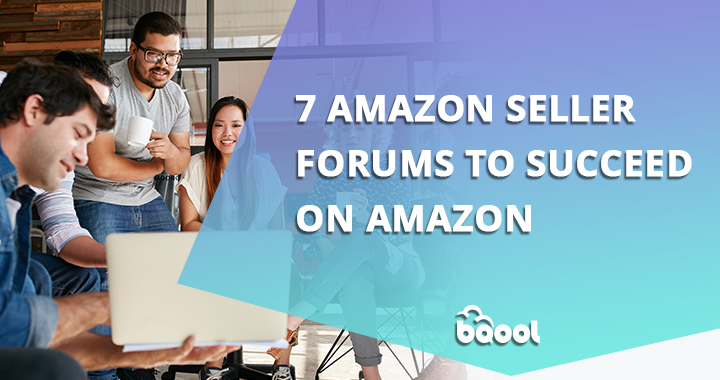10 Best eCommerce Platforms (2020 Comparison)

The rapid advancement of online shopping promotes the development of various eCommerce platforms. Today, one of the worst things a business can do is to choose to stick to the wrong eCommerce platform. Businesses seek solutions that would make their transactions faster, easier and more accurate. At the same time, they are all interested in keeping customers satisfied with the interface and features that the eCommerce platform can offer.
Amazon is always the first choice for both sellers and shoppers when it comes to eCommerce destinations where consumers can find any products at a low price. With increased competition on Amazon, many sellers start exploring other channels to promote their products, increase brand awareness and sales. In this article, we try to provide a brief on the top 10 eCommerce platforms outside of Amazon that can be used for your business.
Shopify
Shopify is the first eCommerce platform that comes to mind. It is probably one of the most advertised systems we have right now. It is also one of the most popular ones, mostly due to its simplicity and ease of use. The price of using this platform ranges between $29 to $299 per month.
It literally takes you less than a few clicks to launch a new store. Once you do, you will be guided through the process of customization to make your new website nice and easy. For such an approach, Shopify is recognized as one of the best eCommerce platforms for smaller businesses with relatively low order flow.
BigCommerce
BigCommerce is also one of the top eCommerce platforms known for now. It is especially popular among medium and big businesses since it offers greater flexibility and scalability. It allows multi-channel selling, which is great for both enterprise-level clients and those businesses which are only at the dawn.
However, it loses to Shopify in terms of loading speed. For some customers, the time they spend waiting for the page to load can affect their desire to buy. At the same time, BigCommerce offers much better SEO performance.
Magento
Magento is an eCommerce platform that is tailored to enterprise-level businesses. An internal team of programmers and developers should work on this platform to create a customized website. Such a requirement makes it unpopular among small businesses.
However, Magento has a variety of features that Shopify and BigCommerce cannot provide. For example, for $20,000 per year – that is the price for the enterprise version – Magento offers unlimited product listings, discount adjustments, recurring payments, and other perks. Its basic version, however, loses to the two previous platforms.
Woo Commerce
Shopify’s primary competitor WordPress has also launched its eCommerce platform whose name is Woo Commerce. This platform is especially popular among small businesses that are only starting their way.
Its best features include a secure payment processor and shopping cart, and, most importantly, it is completely free of charge. Shopping cart integration is the only thing for which businesses need to pay.
Wix.com
Wix is a well-known website platform that serves for creating portfolios, branding websites, blogs, and other similar products. Since recently, it is also one of the best eCommerce platforms. Clients note that super simple setup and other features really make it best in the market.
It offers around 70 free themes that can help you customize your business website to make it look appealing for customers. In order to keep online store hosting, you need to pay as little as $20 per month.
Volusion
Volusion is an eCommerce platform created specifically for newbies. It has a variety of packages that can satisfy the needs of smaller and medium eCommerce sellers, setting them a high pace for growth. The price for Volusion basic version is $14 per month or $135 per year.
Several of its best features include discount code creation, free themes, in-site blogging capabilities, pricing tiers, and others. However, this platform is limited in terms of functionality, so some businesses may require migration to another platform with enterprise-level solutions later on.
SalesForce
SalesForce is one of the most popular platforms that serve mostly businesses operating in the B2C segment. It is entirely cloud-based that makes it advanced and modern. Except for hosting, it offers other CRM and marketing services to enterprise-level businesses.
SalesForce is known in the industry for its management, AI and personalization solutions that are exceptionally needed by MNCs and other international businesses. This platform can handle high order volumes, ensuring quick loading time and other perks to large businesses.
Squarespace
Squarespace allows for quick and easy development of beautiful eCommerce websites. It is famous for the drag-and-drop functions that make it a favorite one among newer eCommerce stores. Most importantly, this platform is the number one choice among artists and other people creating portfolios and online catalogs.
Squarespace has wonderful support, excellent marketing tools, and other advanced features. Its price is around $18 per month.
Big Cartel
Big Cartel is another eCommerce platform that is tailored to artists who seek ways to sell their works. It offers lots of customization features that allow creating a completely unique design. Several other best features include discount adding, inventory tracking, sales stats, etc.
The pricing depends completely on the number of listings the merchant has. It starts with free membership for 5 listings and ends with $30 for 300 listings per month.
3dCart
If your business is interested in leading its own blog, 3dCart is the best platform to choose from. It really has the best blog feature, even compared to Shopify and other popular platforms. Moreover, if you build your eCommerce website with 3dCart, you get access to several advanced business management tools.
3dCart offers free of charge of relatively cheap subscriptions for newer businesses but still has some issues with support and upgrading. If this is not an issue for you, 3dCart is the best for your business.
Final Words
Trade and commercial relationships are moving online across the world, substituting face-to-face and over-the-counter interaction with such notions as customer service and online shopping experience. In 10 years, online trade is expected to dominate across all industries. Thus, today, it is high time you moved your business online, using the best features and technologies provided by the top eCommerce platforms.
Author Bio
Sandra Larson is an assignment writer from Australia who also works as an independent freelance journalist. Since she is interested in the development and advancement of marketing technologies, Sandra could not skip eCommerce in her research. In this article, she tries to provide an objective comparison to the best eCommerce platforms that now exist.








